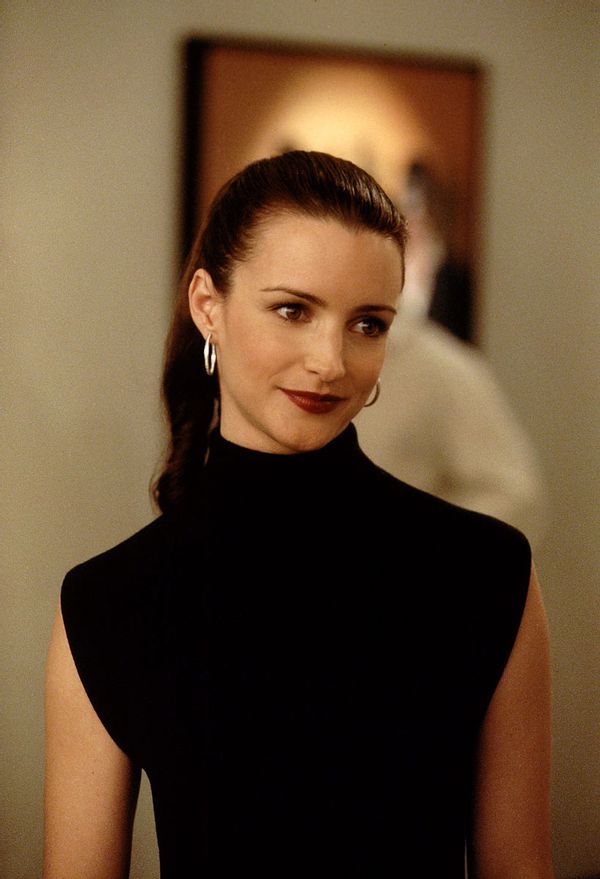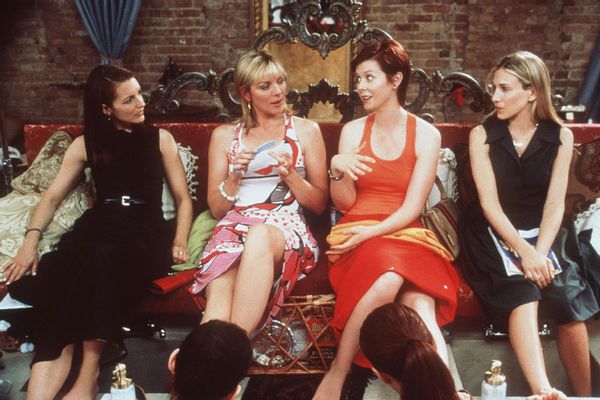
Everyone's obsessed with a promised phone call between Sarah Jessica Parker's Carrie Bradshaw and Kim Cattrall's Samantha Jones for the upcoming season of "And just Like That," as well as Cynthia Nixon's Miranda coming out and dating the divisive Che (Sara Ramirez). But everyone's been focusing on the wrong heroine.
Despite becoming a freelance writer, I now identified with a totally different woman because I was one myself.
I'm a Jewish, liberal Manhattan girl raised by a hippie mother. I never paid attention to Kristin Davis' WASP-y Charlotte York (later Goldenblatt) when "Sex and the City" premiered in 1998. But she eventually resonated in more ways that I could've imagined. Twenty five years later, I realized the truest role model of the series was there all along – hiding behind all the salaciousness.
At 42, I watched the show with an entirely new perspective. I've been through two miscarriages, many failed IVF cycles, and my (still in progress) journey to parenthood has been more complicated than I could've thought. When I rewatched the original series, I realized Charlotte embodied who I should've paid more attention to and the one I currently need.
Almost three decades later, women's health and fertility are still largely unexplored in TV and movies. Yet Charlotte's story which included loss, grief, IVF failure, adoption and eventually, natural childbirth — was vastly ahead of its time. It depicted something more relatable in 2023 – no one is immune from infertility – not even seemingly perfect people like Charlotte.
In the early 2000's, I declared myself to be "a Carrie." I was quirky, aspired to sell stories, and wore tutus, and name earrings – not pearls and cardigans. I'd been told I looked like Sarah Jessica Parker on occasion too.
Charlotte's art gallery job, marriage to the preppy Trey (Kyle MacLachlan), their difficulties with sex and procreation and then later, her story with Harry (Evan Handler) – didn't register at all. Her intense desire to marry and start a family wasn't relatable, and I was more concerned with Carrie's books and her love story with Big (Chris Noth).
But despite becoming a freelance writer, I now identified with a totally different woman because I was one myself. I'd lost a certain prior innocence and understood a new kind of grief. In old episodes, I recognized aspects of my own life.
Upon finding out about Miranda's pregnancy in the fourth season, Charlotte's response is: "Steve only has one ball, it's not fair, how could you do this to me?" She skips baby Brady's first birthday a year later while grieving the early miscarriage of her own surprise pregnancy.
In "Sex and the City's" final season, Charlotte's IVF doctor calls to tell her none of her latest eggs are viable, and she takes up running to cope with the grief. I'd gotten this same phone call from my own doctor . . . on more than one occasion. Watching actress Kristin Davis portray the character's grief so quietly, yet profoundly impacted me. I wasn't a runner but I could understand finding a passion to help yourself heal. In the years since my difficult journey to have a baby, naturally and scientifically, I'd used writing as the same kind of escape.

In the Season 4 episode "Ring a Ding Ding," newly single Charlotte gives her wedding ring to Carrie so she can buy her apartment. "But you love this ring, " says Carrie in protest, to which Charlotte responds, "No, I loved what it represented."
It's a significant moment for their friendship but especially for the character – and symbolized her walking away from a fantasy life, in order to find her real one. It's something every woman struggling to have a baby (or any person for that matter) has experienced. There is a shift when you relinquish one dream so you can welcome another. Though I didn't know it in my 20s, Charlotte was an important cultural touchstone to me in my 40s. I looked to it as a reference point when I finally accepted the loss of any real control over my own fertility.
The series ended with Charlotte and her second husband Harry walking their Cavalier King Charles spaniel puppies, awaiting Lily, an adopted baby girl from China. In the 2008 movie, Charlotte gave birth naturally to a second daughter, Rose.

I couldn't relate to being a PTA, cookie baker, type A mom or navigating daughter Rose's identity changes. Yet, her present life – her loving relationship with Harry and their children – had both traditionally and unconventionally – registered more than any of the other women's lives. But importantly, it highlighted another admirable trait: her compassion.
In the new series' first season, Mrs. Goldenblatt was also the most loyal and supportive friend. When Miranda had obvious drinking issues, Charlotte was the first to notice, while a distracted Carrie ignored it. Then, when Carrie believed Big sent messages from the afterlife through her lamp, Miranda dismissed it. But Charlotte supported the grief-stricken widow when it was needed.
Between bedtime stories, blow jobs, and being a best friend, who I ask you is better than Charlotte York Goldenblatt?
In trailers of the second season of "And Just Like" Charlotte returns to work, bringing her story, and life, full circle. The series briefly touches upon infertility topics again – new character Dr. Nya Wallace (Karen Pittman) confessed to Miranda last season that she had undergone two failed IVF cycles.
Although Charlotte's story is overshadowed most times, upon reflection, it's pivotal. More than any of the other characters, she represented the idea that a happy ending is possible. Ironically, the person I always thought I resembled the least wound up being who inspired me the most.
"And Just Like That" returns for Season 2 on Thursday, June 22.




.jpg?w=600)


